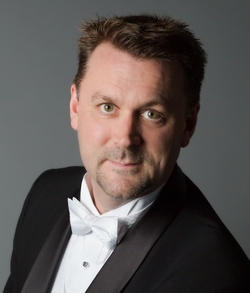Boston Cecilia makes a glorious sound in music for double choir

Nicholas White conducted Boston Cecilia in Brookline Saturday night.
Music for double choir grew out of a distinguished tradition. The genre is long believed to have originated in the 1580s at St. Mark’s Basilica in Venice, where it involved pitting one choir against another with distance in between ensembles. But music for multiple choirs dates as far back as the mid-fifteenth century, and was later perfected by the High Renaissance composer Adrian Willaert.
Composers such as Heinrich Schütz, who in Venice studied with Giovanni Gabrieli, perhaps the greatest practitioner of the style, brought polychoral music to Germany, where it survived in works by Bach and, later, Mendelssohn, Schumann, and Brahms.
Saturday night at All Saints Parish in Brookline, Boston Cecilia, led by Nicholas White, turned their attention to sacred German music for double choir.
Boston Cecilia is a storied fixture in Boston, having thrived for one hundred and forty years. At nearly sixty members strong, the choir sings with a clear, radiant tone and plush blend that is finely spread throughout all registers.
Those aspects were apparent in Saturday’s performance of Mendelssohn’s Sechs Sprüche. Of the six short pieces that make up this work, “Am Neujahrstage” was reverential and “Am Karfreitag” given with a soulful and deep religious fervor. Conductor White built the phrases of “In der Passionszeit” into luminous pillars of sound.
Schumann’s Vier doppelchörige gesänge contains the same rich imagery as his songs. Boston Cecilia’s performance found the deep threads of meaning beneath the text’s surface. The lines of “An die Sterne” glowed like distant starlight. “Ungewisses Licht” sounded with an earthly power, the voices glowing softly to give the final phrase “ist es der Liebe, ist es der Tod?” a sense of mystery. The lines of “Zuversicht” swelled to passages of palpable intensity, and the singers gave the final “Talismane” a ringing declamation.
The opener, Bach’s motet Singet dem Herrn presented a challenge. The piece’s dense web of flowing lines is tough for any ensemble, especially when performed without continuo accompaniment, as this performance was. The choir performed well, though the intricacies of phrasing were sometimes sacrificed in favor of a rich texture of sound.
But Boston Cecilia’s performance grew stronger as the piece progressed. The chorale tune of the second section consisted of handsomely phrased melodies and choral answers, and the “Lohet dem Herrn” bristled with rhythmic energy.
Schütz’s Deutsches Magnificat was also performed a cappella.
Adherents of the historically informed approach to this repertoire may quibble with the glowing, warm blend and tasteful dynamic shading that Saturday’s performance reveled in. But to do so ignores the possibilities of a nuanced performance such as this one.
Boston Cecilia’s rendering was beautifully sung, the voices coming together in rich harmonies that often glide by unnoticed in performances of the piece. The quick sections of this multi-sectional work had a rhythmic vitality, with White coaxing crystalline vocal lines through small delicate gestures.
Brahms’ works for double choir have a palpable intensity, recalling his grandest effort in the medium, the Deutsches Requiem.
His Fest und Gedenksprüche bristled with clear diction and crisply articulated melodies from the choir, which resulted in a performance of stirring power. Geistliches Lied was the treat of the evening. The work’s text calls for listeners to not worry or be depressed, and the music seems to speak of a deep peace from letting go of one’s troubles. Boston Cecilia sang this gem with soft elegance while Barbara Bruns lent supple accompaniment on the organ.
Bruns also contributed fine performances of two organ pieces, which filled out the program.
Bach’s Pièce d’Orgue involves sparkling lines and strings of suspended dissonances, and Brahms’ Fugue in A-flat Minor spins out from short descending phrases. In both, Bruns played with subtlety and expressivity.
Rapturous applause invited White and the choir to offer an encore, a repeat of the beautiful Geistliches Lied.
The program will be repeated 4 p.m. Sunday at St. John’s Episcopal Church, Beverly Farms. bostoncecilia.org
Posted in Performances